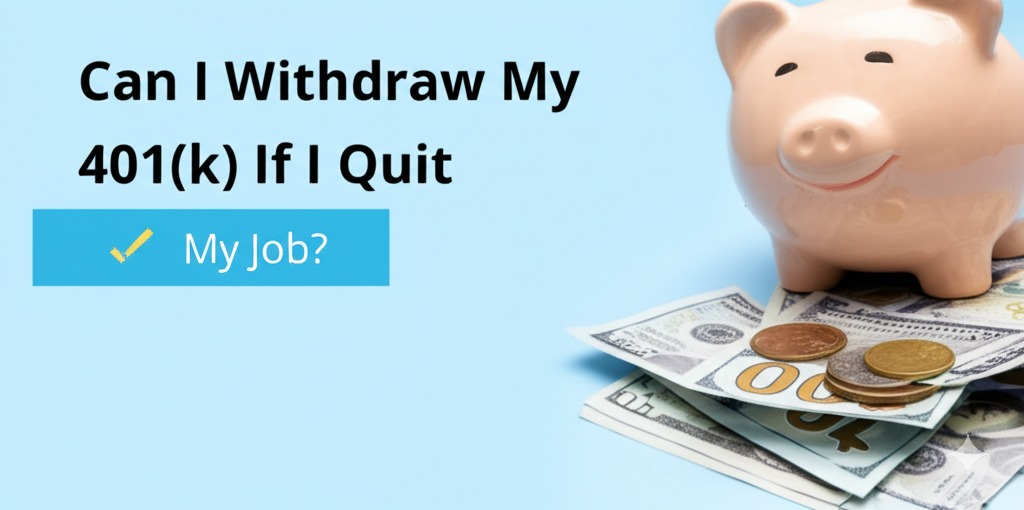
If you’re considering quitting your job, you may be thinking about what to do with your 401(k) retirement savings. One of the most common questions people have when they leave a job is whether they can withdraw their 401(k) funds. The answer isn’t straightforward, and understanding your options is key to making the best financial decision for your future. In this article, we’ll dive into the details of withdrawing your 401(k) when you quit your job, along with the potential consequences and alternatives that could be in your best interest.
What Happens to Your 401(k) When You Quit Your Job?
When you leave your job, your 401(k) doesn’t just vanish. However, what happens next depends on several factors, including your age, the type of 401(k) plan you have, and the specific rules set by your plan administrator.
Vested vs. Non-Vested 401(k)
Before diving into withdrawals, it’s essential to understand the concept of vesting. Vesting refers to the portion of your 401(k) that you have full ownership of. If you contributed to your 401(k) but your employer also made contributions, you may not have full ownership of all the funds in your account right away.
- Fully Vested: If you’re fully vested, you can take both your contributions and your employer’s contributions with you.
- Non-Vested: If you’re not fully vested, you may lose part or all of the employer’s contributions when you leave the job.
It’s important to check your vesting schedule before you quit to know exactly what you can take with you.
Can You Withdraw Funds From Your 401(k) After Quitting?
The short answer is yes, you can withdraw from your 401(k) after quitting your job—but there are restrictions and potential penalties to consider.
Age Matters: Early Withdrawal Penalties
If you’re under the age of 59½, withdrawing money from your 401(k) can result in early withdrawal penalties. The IRS typically imposes a 10% penalty on any amount you withdraw before reaching this age. In addition to the penalty, you’ll also owe income taxes on the withdrawal amount.
For example, if you withdraw $10,000 before age 59½, not only will you face a 10% penalty ($1,000), but you’ll also owe income taxes on the $10,000, depending on your tax bracket.
Exceptions to the Early Withdrawal Penalty
There are certain circumstances where you can withdraw from your 401(k) without facing the early withdrawal penalty. These include:
- Becoming disabled
- Using the funds for medical expenses exceeding 7.5% of your adjusted gross income
- Taking a loan from your 401(k) (although not a true withdrawal)
- Being in financial hardship (such as paying for college tuition or preventing foreclosure)
However, even in these cases, you’ll still owe income tax on the withdrawn amount.
Alternatives to Withdrawing Your 401(k) After Leaving a Job
Instead of withdrawing the funds, there are a few alternatives to consider that may be more beneficial in the long term.
Roll Over to an IRA
One of the best options for your 401(k) after quitting a job is to roll over the funds into an Individual Retirement Account (IRA). Rolling over your 401(k) allows your money to continue growing tax-deferred without incurring penalties or taxes, as long as you follow the proper procedures.
Benefits of a Rollover:
- Continued tax-deferred growth
- More investment options than a 401(k)
- Avoidance of early withdrawal penalties
A direct rollover is typically the easiest and most tax-efficient way to transfer your funds.
Roll Over to Your New Employer’s 401(k)
If you find a new job with a 401(k) plan that allows rollovers, you can transfer your old 401(k) into your new employer’s plan. This can help keep your retirement savings in one place, making it easier to manage.
Leave Your 401(k) Where It Is
Many employers allow former employees to leave their 401(k) funds in the company’s plan, especially if your balance is over a certain threshold (usually $5,000). This option can help you avoid the early withdrawal penalty and continue growing your funds.
Cashing Out: A Last Resort
While it’s possible to cash out your 401(k) after quitting your job, it’s generally not the best option. Besides facing potential penalties and taxes, you lose the long-term growth potential of your retirement savings. Cashing out should only be considered in cases of extreme financial need.
Key Considerations Before Withdrawing Your 401(k)
Before making a decision about withdrawing your 401(k), there are a few important factors to consider:
Impact on Your Retirement Goals
Withdrawing your 401(k) early can seriously undermine your retirement savings. Even though it may seem like a quick solution, the long-term consequences could jeopardize your ability to retire comfortably.
Tax Implications
Any withdrawal from your 401(k) will be subject to income tax, and depending on your age, you could also face early withdrawal penalties. Weighing the tax implications before cashing out is crucial.
The Power of Compound Growth
Money in your 401(k) continues to grow tax-deferred. Taking a distribution now means giving up potential growth over the years. If possible, it’s often better to leave the money in your account or roll it over into an IRA to take advantage of compounding.
Conclusion: Making the Right Choice for Your Financial Future
When you quit your job, the decision regarding your 401(k) is an important one that can impact your long-term financial health. While you can withdraw the funds, it’s typically not recommended due to the tax consequences and penalties involved. Exploring options like rolling over your 401(k) to an IRA or your new employer’s plan can help you maintain your retirement savings’ tax-deferred growth.
Before making any decisions, it’s important to evaluate your situation carefully and consider consulting a financial advisor to ensure you’re making the right choice for your future.

Andre Cuevas provides career insights, job search strategies, and professional advice to help individuals navigate the job market and achieve their career goals.





